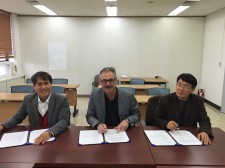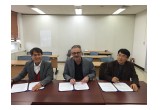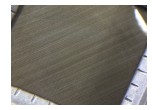2C Light Co. Ltd. and TK Corporation Sign MOU for Exclusive Supply of Electricity Generating Solar Fabric, SolFab™

Christchurch, New Zealand, November 29, 2016 (Newswire.com) - The dreams of many, to manufacture a practical fabric capable of generating electricity from the sun, has been realised this month in South Korea, and 2C Light was there to bring it to market.
After they released a paper describing its function on Nature.com in 2014, the Korea Electrotechnology Research Institute, have been developing the manufacturing process of this incredible fabric, and it will soon be ready for full scale production.
After many years producing solar wearable technology products, 2C Light has been looking for a source of power that can be more highly integrated into fashion and other outdoor equipment.
Simon Dyer, CEO
The signing of the Memorandum of Understanding last week between 2C Light Company and TY Corporation, allows 2C Light to be the exclusive supplier of this leading technology.
“After many years producing solar wearable technology products, 2C Light has been looking for a source of power that can be more highly integrated into fashion and other outdoor equipment, so people may charge their cell phones and power other technologies whilst on the move,” says Simon Dyer, CEO and Founder of 2C Light Company, based in New Zealand.
This fabric will be weaved on a rapier loom that allows a comparatively low cost, highly scalable and low environmental impact production process.
“We are very excited to complete this agreement for the exclusive rights to market the SolFab™ technology, and we look forward to working with product designers from a wide range of industries such as wearable device manufacturers, outdoor equipment makers, military suppliers and perhaps also, drapery, blind or shade makers,” said Mr Dyer.
There are many advantages to this SolFab™ solar fabric compared to most other photovoltaic generators, including:
· Durability – repeated rolling and bending
· Manufacturability – roll to roll weaving process
· Partial shade does not block power generation
· Amorphous - low light power generation is proportional to available light
· Blocking diode not required – no loss of voltage
· Many shapes supported – allows for clothing panel
· Logo impression possible – OEM design supported – customer logo can generate power
“Pricing has not been confirmed, however it should be comparable to existing photovoltaic technologies plus a small surcharge for the added benefits of this marvelous fabric,” says Mr Dyer.
Commercial production samples are expected to be available in Q2 2017.
To register your enquiry for supply of SolFab™, please contact the author or via the company website 2CLight.
Source: 2C Light Co. Ltd.

